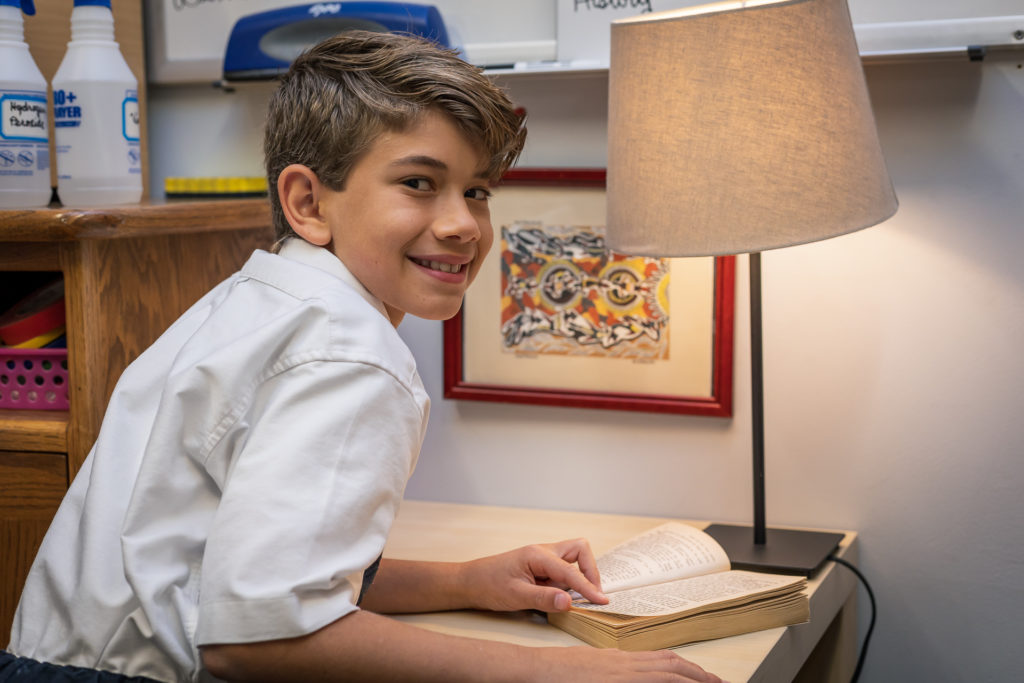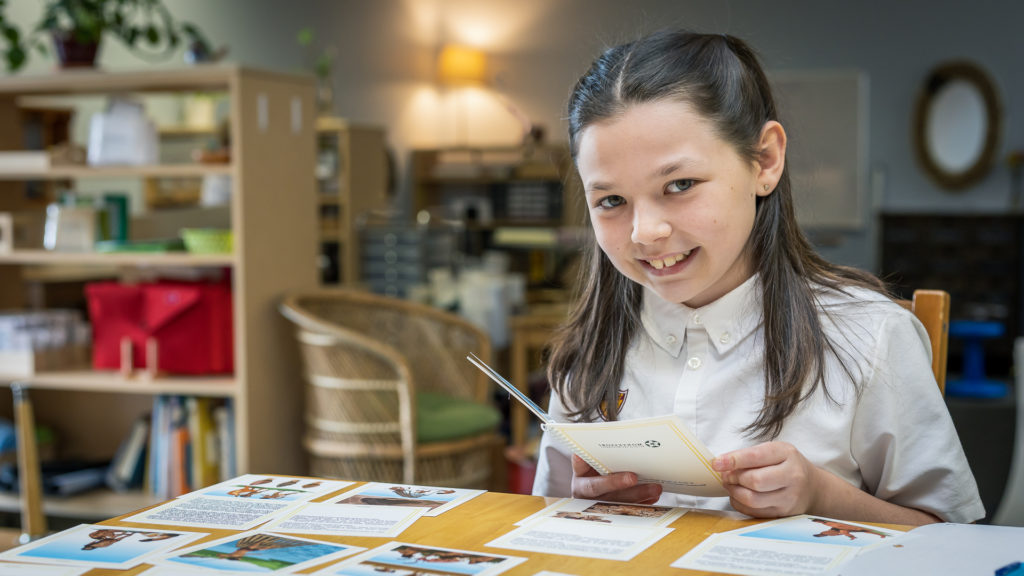Our Montessori Upper Elementary program empowers students as they embark on a journey towards a more practical life, and to take full control over their academic progress, building confidence through their unique strengths and interests. As they spread their wings, they are ready to start their journey of success in their academics and facing new challenges. They are now prepared to take this journey into adolescence.
“Education must not simply teach work – it must teach Life.“
W.E.B. DU BOIS

Spiritual Formation
As the students being to more deeply understand the meaning of life and the purpose of their existence, they also strengthen their faith which is extremely important as they are stepping out into the world. We consider it the responsibility of our Catholic school community – teachers, students, staff, parents – to “always and everywhere” translate the inspiration of Jesus into
real terms: in the classroom, in the church, in the atrium, in the hallway, on the playground, in the meeting room, and in the countless informal gatherings and conversations that make up the life of the community.
We believe that faith comes from practice, teaching, understanding, and the environment provided to the individual. We try to eradicate all the negatives from the environment. Secondly, faith should shape the curriculum, not by artificially trying to make the content Catholic, but by uniting all subjects within a Catholic world view, and that is exactly our goal.

Academic Excellence
More than ever before, children at this age are very curious to find out the why’s and the how’s. They have a zeal to explore complex ideas, and get ready to make new connections, both with ideas and people. We encourage students in developing their research, independent study and time management skills so they can learn to ask and answer their own questions independently. It is during these years, between the ages of nine and twelve, that children transition from learning to read to reading to learn. We provide all the necessary elements according to the requirement of each student that will help them to pursue their personal interests and passions, including the skills needed to plan and implement their own field trip experiences. For these experiences, students are guided as they independently research, plan and organize their own off-campus excursions which serves to deepen their understanding of curricular topics and help to build a connection with the world outside.

Social Responsibility
At this age children are eager to take on new responsibilities and to fulfill difficult tasks. They start to get aware of the social norms and develop ways to cope with them. We continue to support the ideas and interests of the students by providing group work, activities, projects, and leadership opportunities where students get a chance to lead from the front and to overcome hurdles.
These students, in their most critical period for social and moral development, are also beginning to gain a higher understanding of their place in their community and world. They begin to understand their value as an individual and how important of an asset they are for society.
To further encourage this development, every student is given opportunities to explore how they directly impact themselves, others, and their environment. This helps them develop themselves, respect for others, and respect for the environment. They are also guided in catering to their needs on their own. These projects, which are primarily student-driven, empower them as they begin to set-off in this world.
The following subjects are taught in Elementary 2:
Language
The Montessori approach to language begins by understanding that language is a major achievement of the human being. As language helped humans build early cultures and civilizations, it also aids children in the work that they must do in the environment. Language can be viewed as a tool or a system that is used to communicate.
Not only do children learn the grammatical rules of language, but they explore the reasons that words exist in the first place. They explore why words are placed in a certain order and why punctuation marks are used.
Children are given opportunities to explore and discover language in a way that inspires wonder and joy. One of the greatest discoveries of the elementary child is that language has power. Through the exploration of reading, researching, and the creative process of writing, children develop and polish their writing skills and command of the English language.
Mathematics & Geometry
In the Elementary classroom, Montessori approaches math and geometry as two separate subjects, but still integrated with each other and with the entire elementary curriculum as a whole. Children discover that mathematics has been connected with the lives of human beings from the very beginning of time on earth, and that the mathematical mind is universal and inherent in every human. Because of this trait, mathematics also belongs to the child. In Montessori Elementary, children approach mathematics as another exciting adventure. As guides, classroom teachers give much variety in all areas of mathematics and lead the children to make discoveries. If the children cannot learn a concept one way, a different piece of material may be offered. Guides encourage children to discover the largest and the smallest problems and guide them to make up their own problems. Children use concrete materials to help them understand abstract concepts. Children learn at their own pace. By the end of elementary, they understand the how and the why of each math concept and how to do it without help of materials.
Social Studies
The Montessori approach to Social Studies begins with the Great Lessons in Geography and History. Through the presentation of the Great Lessons, Guides appeal to the imagination and reasoning mind of the elementary child. A foundation is laid for the child to explore the earth and human history from the beginning of creation through the present day and even looking toward the future impact they will have on this world. They work extensively with timelines and charts that depict creation, the beginning of life, the beginning of human life, and early developments in civilization including math and language. History is taught in a very integrated way, expressing an understanding that humans are creators who use their intellect, and what they find in their environment to meet their needs. With an understanding of basic human needs, they explore the rise and fall of many civilizations throughout history. With this deep understanding of history, they are able to explore current events and their role in the world.
Science
Science is an integrated approach in the Montessori curriculum, loosely broken up into two areas: Geography and Biology. The introduction to science comes on the first few days of the year for the elementary child when children are introduced to the history of the universe, life, and how humans are all created to interact in order and peace. These great lessons are threaded with many experiments, all of which are built on throughout the years in the elementary classroom. In biology children are shown the how and the why of the four main parts of a plant: root, stem, leaf, and flower, and their uses. They work on classification of both plants and animals and study the web of life throughout their time in the classroom. And, they apply their knowledge beyond the classroom in beautiful outdoor learning environments.
Music
Music includes singing, music theory, ear training, eurhythmics, composition, the production of music, history, and literature. The individual may experience music, and it could also be small or large group work. All aspects of music come together as a whole though singing, history, movement, and composition. Music can inspire interest in math and language. Music notation is really another code, and elementary children love codes. That code can be another form of communication. Music builds community in the elementary classroom and throughout the school. During singing times, some subjects taught are pitch, volume, tone, listening exercises, music appreciation, solfege, rhythm and beat, major and minor scales, harmony, and rounds, among many other concepts. Musical notation is extended in the Upper Elementary classroom with the addition of instrumental music lessons and ensembles.
Technology
In the Montessori Upper Elementary room we begin to integrate more technology into the environment. Technological tools are introduced and children are shown how to use them to complete tasks and research in other areas of curriculum. They learn keyboarding, word processing, online resources, and most importantly, Internet safety and media literacy. Technology and the tools that we have are a way to enhance the materials already in the Montessori environment and further the exploration of the children. In the E2 environment, children are connected with the world of technology that they will be using for the rest of their lives. They practice the skills needed to operate the technological tools available to them in our digital age.
Specialists
In addition to the main curricular areas, the Elementary Program also welcomes specialist teachers into its environments for Spanish. Outside the classroom, elementary children participate in physical education.
